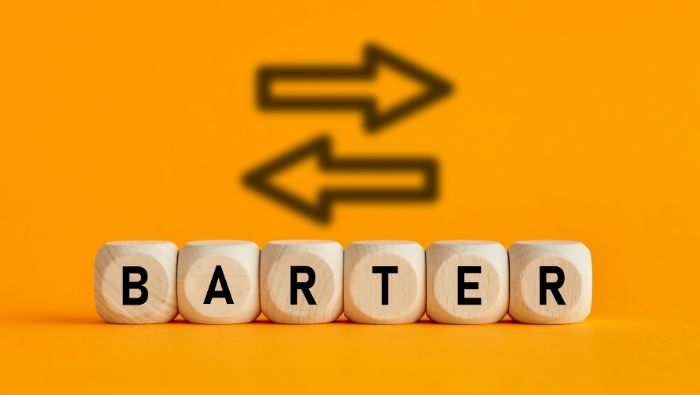Barter Your Way to Some of Life’s Luxuries
Whatever your age, bartering can be a good means of meeting some of your needs and wants without spending your hard-earned money.

If you find that your spending tends to outpace your income or that your income doesn’t allow you to enjoy some of life’s luxuries, you might want to consider barter.
My first two experiences with barter should actually be called “partial barter.”
In the first instance, I read to a blind Italian-speaking pianist who was trying to improve his English. This was in Lugano, Switzerland, and the pianist’s father ran a hotel. My pay was minimal, but was topped up with a gourmet dessert from the hotel’s kitchen.
Later, in Zuerich, I tutored the cousin of a friend. He was a French-speaking Swiss boy hoping to enter the academic stream of a German-language high school. I was to teach him German grammar. Once again, minimal pay was topped up with food. This time, it was a complete evening meal. In both cases, I saw an aspect of Swiss life that most foreigners miss. The experience also meant that, for one evening a week, I was not able to go out and spend money.
Barter for Professional Services
I am a great believer in the benefits of massage. However, massages are expensive.
A friend in California belongs to a massage exchange network. That seemed like such a good idea that I took a short course that would allow me to participate in such a network, but I now live in Nova Scotia where there is no such network. Instead, I get massaged by students in the graduating class of a massage school.
This is a type of barter since I allow them to practice on my body in return for a more than 50% reduction in the price of a massage.
Sign Up for Savings
Subscribe to get money-saving content by email that can help you stretch your dollars further.
Twice each week, you'll receive articles and tips that can help you free up and keep more of your hard-earned money, even on the tightest of budgets.
We respect your privacy. Unsubscribe at any time.
Barter for Some Culture
I’m hooked on classical music, and I sometimes think that, had I not spent so much on opera, ballet and concert tickets, I would now be independently wealthy.
Many cities use volunteer ushers in concert halls. These ushers get to enjoy a performance, or most of it, for free. At least one usher must wait outside until a suitable break when latecomers may be seated, but most of the ushers can hear and see the entire performance.
An usher friend in Cleveland is fortunate to be able to hear the Cleveland Orchestra, one of the world’s leading orchestras, in Severance Hall, one of the world’s best concert halls, for free. Tickets for these performances are neither inexpensive nor readily available.
Barter for Vacation Accommodations
House swapping is a great way to reduce vacation costs.
This can be done in two ways. You can occupy your swappers’ home while they occupy yours or you can visit them and then they can visit you. Both arrangements have their advantages and disadvantages.
There are agencies that arrange for inspection and take care of the organizational details if you can’t find a house-swapping partner among your friends and relatives and their acquaintances.
Is debt cramping your lifestyle?
Imagine how much simpler life could be if you were debt free. We can help you make a plan to get there.
Barter for Foreign Language Lessons
Do you want to learn a foreign language, but don’t have the money for tuition?
Why not try a “teach yourself” book and get a native speaker to help you with pronunciation in return for English conversational practice.
Barter for a Ride
If you stop to think about it, car pooling is really a form of barter, and a profitable one. There is a bonus with this one: you are helping the environment.
Barter for Just About Anything
Are you a keen former-gardener now living in an apartment or condo? Perhaps you have a friend with a house and yard but not a green thumb. You could arrange to create a flower bed for them or maintain their garden for the season in return for invitations to their tennis club.
If you no longer own a car, you might prefer that they offer you a day in the country. Even if you would like to offer someone a service with no strings attached, don’t refuse all reciprocity. It makes people feel good.
Barter can be wonderful for seniors, many of whom find themselves with more time than money. Think of the possible combinations: piano lessons for French lessons, lawn mowing for a cooked meal, hand-knit mittens for hedge-trimming, a haircut for a casserole. The priceless byproduct of barter is companionship, which is especially important for seniors who have lost loved ones.
Whatever your age, though, barter can be for you. Use your imagination. Above all, have fun!
Reviewed March 2024
Popular Articles
On After50Finances.com
- 9 Things You Need to Do Before You Retire
- You Didn’t Save Enough for Retirement and You’re 55+
- When Empty Nesters Reorganize and Declutter Their Home
- Reinventing Your Career in Your 50s or 60s
- What Mature Homeowners Should Know about Reverse Mortgages
- 2 Reasons to Collect Social Security Benefits As Soon As Possible

